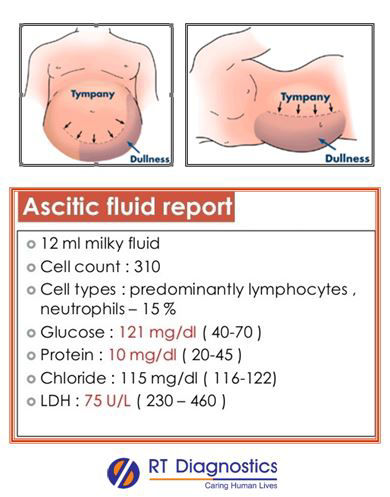ASCITIC FLUID – CHLORIDE:
Why the Ascitic fluid Chloride test?
CLINICAL INFORMATION :
Ascitic Fluid test is done to detect peritonitis. This test detects the cause of effusion (such as infection due to bacteria, virus, fungi, etc, or non-infectious / inflammatory condition causing peritonitis eg. Congestive heart failure, nephrotic syndrome, hepatic cirrhosis, pancreatitis, ruptured gall bladder, rupture of the appendix, autoimmune diseases, etc – Transudate or Exudate) of fluid accumulated in the peritoneal cavity and sometimes around the internal organs. Treatment of ascetic cirrhosis requires monitoring of blood biochemistry. The clinical or medical intervention could become much easier by direct measurement of ascites. Hence the aim of diagnosis and prognosis depends on the correlation of sodium (Na), potassium (K), chloride (Cl), bicarbonate, creatinine, protein, etc, and it is compared with corresponding electrolytes level in the venous blood specimen of the suspected ascetic patients. Ascites can result due to infectious causes or due to certain disorders in conditions such as liver cirrhosis, circulatory dysfunction, tuberculosis, pancreatitis, underactive thyroid, heart failure, cancer of peritoneum, liver, lymphatic system, ovaries, breast, bowel, stomach, pancreas, lung, womb, etc. Ascetic fluid chloride test is performed to measure the levels of electrolytes such as chloride before and after diuretic therapy in patients as a protocol for prognosis. Symptoms of ascites include nausea, vomiting, tiredness, breathlessness, urine urgency, and constipation and the clinical findings with signs of ascites include fluid retention causes pressure on other internal organs causing discomfort, bloating, abdominal and back pain, etc. Complications of ascites are spontaneous bacterial peritonitis (a life-threatening infection), blood sepsis, migration of fluid into lung cavities, hepato-renal syndrome, weight loss and protein malnutrition, mental confusion, altered consciousness. Change in level of alertness and/or COMA (hepatic-encephalopathy). Other tests for confirmation of ascites include ultrasound and imaging studies like X-Rays, MRI, CT Scan, etc, and systematic clinical examination procedures such as inspection, auscultation, percussion, palpation, and scratch test are performed for bulging flanks, flank dullness, shifting dullness, fluid wave, puddle sign, etc, are tested and elevated jugular venous pressure is also checked and further biochemical investigations such as liver function tests (to check impaired liver function), coagulation tests, etc.

General instructions:
Sample Requirement: Specimen –Aspiration of Ascitic fluid from the peritoneal cavity. Test Preparation: None.
NOTE - Sample for specimen collections may vary based on the patient’s condition/cases according to the patient’s presenting complaints/signs or symptoms:
SPECIMEN REQUIREMENT (Special or Rare Cases) - As instructed and guided by Physician / Clinician / Pathologist / as per Laboratory’s requirements, according to procedures and protocols.
This Multi-Specialty Clinical Referral Laboratory RTDIAGNOSTICS provides precise and accurate tests with an extensive range of testing services to the medical centers to help in the diagnosis and identification of pathology in the test specimens for infectious diseases and also to evaluate the function of organ systems of the patient. It prevents further complications and helps to stabilize and restore health to near normalcy at the earliest without delay.



